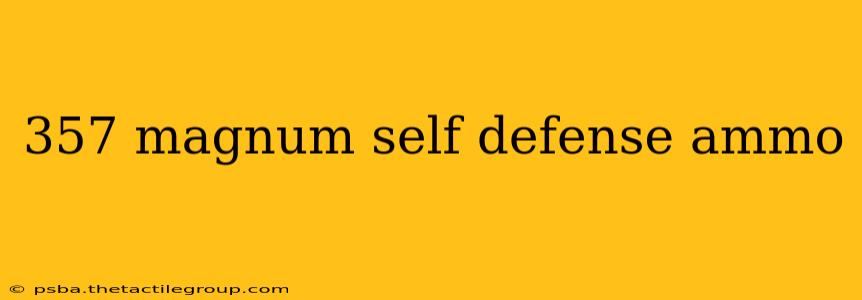Choosing the right ammunition for self-defense is a critical decision, demanding careful consideration of various factors. The .357 Magnum, a powerful cartridge known for its stopping power, is a popular choice, but selecting the optimal ammunition requires understanding its nuances. This guide delves into the key aspects of .357 Magnum self-defense ammo, helping you make an informed choice.
Understanding the .357 Magnum's Power
The .357 Magnum's reputation precedes it. Its significant stopping power stems from its large diameter bullet and high velocity, capable of delivering substantial energy upon impact. This makes it effective against a wide range of threats. However, its powerful recoil necessitates proper training and practice to handle effectively.
Key Considerations When Choosing .357 Magnum Self-Defense Ammo
Several factors influence the effectiveness of .357 Magnum self-defense ammunition:
1. Bullet Type:
-
Jacketed Hollow Point (JHP): JHP rounds expand upon impact, increasing their stopping power and reducing penetration. This is generally considered the best choice for self-defense, minimizing the risk of over-penetration and harming bystanders. Look for reputable brands known for consistent expansion.
-
Full Metal Jacket (FMJ): FMJ rounds are not recommended for self-defense. Their design prioritizes penetration over expansion, posing a higher risk of over-penetration and collateral damage. While they might be suitable for target practice, they are not ideal for self-defense situations.
-
Soft Point (SP): SP rounds offer a compromise between JHP and FMJ. They expand upon impact but are generally less reliable in expansion than JHPs.
2. Grain Weight:
The grain weight (weight of the bullet in grains) influences the bullet's velocity and energy. Heavier bullets (e.g., 158-grain) often deliver more stopping power at shorter ranges, while lighter bullets (e.g., 125-grain) offer higher velocity, potentially increasing penetration. The ideal grain weight depends on individual firearm characteristics and personal preferences. Consult your firearm's manual for recommended grain weights.
3. Manufacturer Reputation:
Choosing ammunition from a reputable manufacturer is paramount. Established brands invest heavily in quality control, ensuring consistent performance and reliable expansion. Research reviews and test results to identify manufacturers with a proven track record.
4. Practice Ammunition:
It is crucial to practice regularly with the same ammunition you intend to use for self-defense. This allows you to become familiar with the firearm's recoil, accuracy, and the ammunition's performance.
Beyond Bullet Type: Additional Factors
-
Personal Preference: Consider your comfort level with different recoil levels and accuracy. Ultimately, the best ammunition is the one you shoot consistently and accurately.
-
Environmental Conditions: While less critical than other factors, extreme temperatures can affect ammunition performance. Consider this if you live in an area with significant temperature variations.
-
Legal Considerations: Local laws may restrict certain types of ammunition. Always check your local regulations before purchasing self-defense ammo.
Conclusion: Informed Choice is Crucial
Selecting the right .357 Magnum self-defense ammunition is a multifaceted process. This guide has explored the key factors to consider, highlighting the importance of bullet type, grain weight, and manufacturer reputation. Remember to prioritize safety and thorough training, ensuring you're well-prepared to handle this powerful cartridge responsibly. Always consult with experienced firearms instructors and experts for personalized guidance.

